SWEDISH SOUTH ASIAN STUDIES NETWORK
Meetings in Lahore Wednesday 26 November 2003:
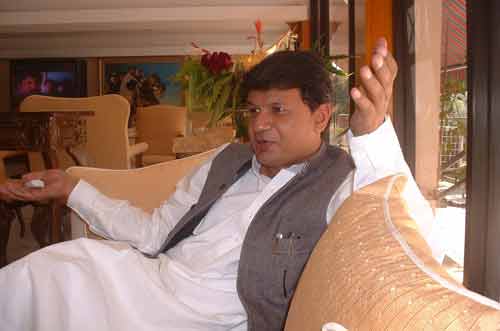 Film
and Management Studies
Film
and Management Studies
We had made an appointment at noon with Mr. Abdul Hameed, Director of the Center for New Media Film & Television Studies (NM-ftv), an independent institution based at New Garden Town in Lahore. He picked us up at Gymkhana Club, and while talking we were going for a drive through the lush green streets of Lahore. Such a contrast to Karachi, with neat and clean streets everywhere, plenty of green parks and gardens. We experienced the same feeling that many before us also have got, that this probably is one of the best cities that the Indian subcontinent can offer.
Abdul Hameed has studied media and film in Australia, and after that had a varied career in government institutions and at university (the National Academy of Arts) before he etablished the NM-ftv a couple of years ago. It is said to be Pakistan’s first film school, a necessary pre-condition for building new independent TV-channels in Pakistan, that today is totally dominated by the state TV channel PTV, and by foreign commercial channels. Abdul Hameed has managed to make a deal with a new private university, the IQRA University, and its Department of Communication, to give a degree programme in media and communication, so NM-ftv now concentrates on the film making.
NM-ftv through the Internet has invited foreign scholars and film makers to come for some period of time to teach and make films or other media-oriented projects in Lahore. They have been provided free board and lodging and full assistance in making films, etc, in exchange of teaching for the same amount of time at the Centre. In the year 2002 three Swedes stayed with the institute – the poet Carl Forsberg from Göteborg, and the two journalists Carl Godani and Daniel Wilby. Forsberg wrote an article about NM-ftv in the magazine SYDASIEN, No. 2/ 2003, also available on the Internet. The article is called ”Pakistansk filmskola satsar på ambitiöst utbytesprogram med Sverige”.
Hameed now plans to make a film about the wave of Pakistani immigrants coming to Norway and Denmark in the 1960’s, and their integration or lack of integration that they have experienced into their host societies. According to Hameed a large proportion of these immigrants come from one specific district in Punjab, namely Jhelum and Gujrat. Another film project he hopes to realize later is to make a film about the Indus river basin, travelling from the sources high up in the Himalayan mountains down to outlet in the Arabian Sea. It would be a film about shifting landscapes, peoples, and cultures but also about the water problems all along: pollution and scarcity. We suggested that he makes the river alive by making an analogy to the human life cycle from cradle to grave and he appreciated the idea.
Meeting with Ahmed Ghazali, Lahore Law Group
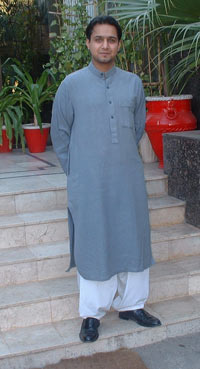 Later
on in the afternoon we met Mr. Ahmed Ghazali,
who has been working as a lawyer working with a private law firm, Lahore
Law Group, for three years, after completing his studies at the University
of London. The law firm he works for is working hand in hand with the
Punjab University; Kinnaird College; Peshawar University; and Lahore University
of Management and Sciences (LUMS), in training and research programmes
related to law and public policy, business and the environment. Ghazali
himself is very engaged in environmental issues, and he plans to apply
for a Masters course at the International Institute
for Industrial Environmental Economics (IIIEE) at Lund University
starting in September 2004. It is in connection with his application to
this course that he came into contact with us at SASNET, through our web
site giving information on IIIEE, and he wrote to us about meeting here
at Lahore during our tour.
Later
on in the afternoon we met Mr. Ahmed Ghazali,
who has been working as a lawyer working with a private law firm, Lahore
Law Group, for three years, after completing his studies at the University
of London. The law firm he works for is working hand in hand with the
Punjab University; Kinnaird College; Peshawar University; and Lahore University
of Management and Sciences (LUMS), in training and research programmes
related to law and public policy, business and the environment. Ghazali
himself is very engaged in environmental issues, and he plans to apply
for a Masters course at the International Institute
for Industrial Environmental Economics (IIIEE) at Lund University
starting in September 2004. It is in connection with his application to
this course that he came into contact with us at SASNET, through our web
site giving information on IIIEE, and he wrote to us about meeting here
at Lahore during our tour.
Lahore University of Management and Sciences, LUMS
Just before sunset we visited the Lahore
University of Management and Sciences (LUMS), a well-reputed private
university with about 1 500 students,. It was established in the 1990’s
with courses in economics, business management, and computer science/computer
engineering; on BA, MSc and PhD levels (at present only five PhD students
however – in Mathematics).
LUMS is considered to be leading institution in its field in Pakistan,
and it recruits the cream of the Pakistani students. The fee for studying
one year at LUMS is at present 498,000 rupees (equal to about 9,000 US-dollar),
though scholarships are available. In the year 2001–2002 students
were given around 14 million rupees as financial aid. These scholarships
are made possible by donations from a number of banks and companies.
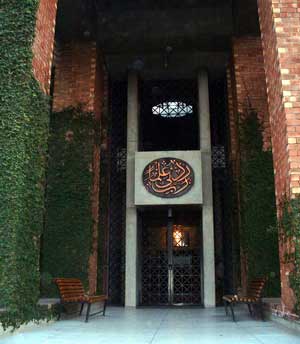 From
being a pure business school, initiated by the Pakistani industrialist
Syed Babar Ali (also Swedish honorary consul
to Pakistan), LUMS has during the last two years gradually started to
include also Arts and Social Sciences in its curriculum. LUMS has recently
also started a law school, for which they now look for faculty.
From
being a pure business school, initiated by the Pakistani industrialist
Syed Babar Ali (also Swedish honorary consul
to Pakistan), LUMS has during the last two years gradually started to
include also Arts and Social Sciences in its curriculum. LUMS has recently
also started a law school, for which they now look for faculty.
We visited the Social Science Department, where we were shown around by
Dr. Ghazala Irfan, associate professor of
philosophy. Dr. Irfan who functions as the co-ordinator of the department
was recruited to LUMS from the University of Punjab where she previously
served for 25 years.
In 1994 USAID provided 10 million US-dollars for building
the magnificent campus situated in the Cantonment area of Lahore. Despite
the fact that it was Eid day we made a quick tour around the university,
built in Mughal style, with departments in a huge circular building with
an inner hexagonal court yard used for meetings, convocations, etc. This
makes it easy to reach colleagues in other departments, and reminded us
of a medieval European walled town.
LUMS is very interested in sending students abroad after they have finished
their studies at Lahore. They could also think of accommodating foreign
students, as LUMS has excellent dormitory facilities.
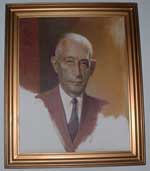 The
university has a special connection to Lund. Tetra Pak has had a big presence
in Lahore with a large manufacturing unit, and has been one of the biggest
donors to LUMS.
The
university has a special connection to Lund. Tetra Pak has had a big presence
in Lahore with a large manufacturing unit, and has been one of the biggest
donors to LUMS.
On its premises there is now the Rausing
Executive Development Centre (REDC), named after the Swedish industrialist
Ruben Rausing – founding father of
Tetra Pak (with his portrait hanging on the wall), housed in
a beautiful building in style with the rest of the university complex.
The centre, inaugurated in 1989, has auditoriums and seminar halls and
guestrooms for students from companies (often business executives) attending
seminars and courses, and a one-year Management Development Programme,
training managers from all over the world, as far away as Trinidad and
Fiji Islands and as near as Bangladesh and Sri Lanka.
REDC has been supported in its training efforts by the development agencies
such as the Commonwealth Secretariat; the Management Training and Services
Division; and the World Bank. About 40 programmes are offered annually
serving about 1,500 executives.
REDC also arranges major external conferences, e g the UNDP Asia Ministerial
Conference on Sustainable Growth, Equity and Governance in 1996; and a
12-days training conference for the LEAD International in 2001, an event
attended by more than 200 participants from 45 countries.
Meeting with Dr. Ghazala Irfan
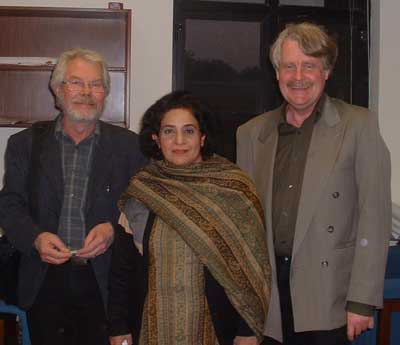 We
were also invited to the artistic home of Dr. Ghazala Irfan. As one of
three Pakistani representatives she was a few days later supposed to go
for an International conference in Sri Lanka on “Teaching of
Philosophy in an Asian context”, organised by the Dept. of
Missiology, Aachen University, Germany.
We
were also invited to the artistic home of Dr. Ghazala Irfan. As one of
three Pakistani representatives she was a few days later supposed to go
for an International conference in Sri Lanka on “Teaching of
Philosophy in an Asian context”, organised by the Dept. of
Missiology, Aachen University, Germany.
We discussed the image abroad of her country, and she pointed
out to us the necessity of breaking the false and one-sided notion on
Pakistan and its people, now prevalent in the West.
‘They think we are all fundamentalists supporting terrorists. How
can it be? True, there are many fundamentalists here, but still the vast
majority is not. And terrorists, very few indeed, and certainly not more
than in most other Islamic countries of West Asia.’
She was seriously worried about this image.
‘Personally, we don’t know of any fundamentalists, and we
fight them in public. This is just like any other country, and there are
probably more fundamentalists in the United States.
Swedish connection to Lahore
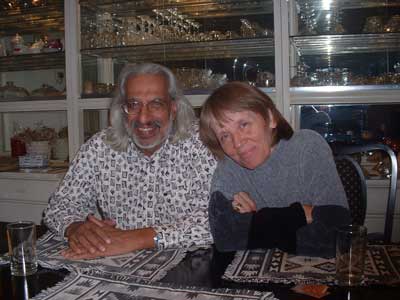 We spent
the evening with Maqbool and Maj-Britt
Babri, a Swedish-Pakistani couple settled in Lahore for 20 years,
and now living in a well-planned house in Defence Colony. Maqbool, more
often called by his nickname Max, speaks Swedish fluently.
We spent
the evening with Maqbool and Maj-Britt
Babri, a Swedish-Pakistani couple settled in Lahore for 20 years,
and now living in a well-planned house in Defence Colony. Maqbool, more
often called by his nickname Max, speaks Swedish fluently.
He is a trained psychologist, and studied and worked in Sweden in the 1970s. He passed the Masters programme in Ergonomics at the Division of Industrial Ergonomics, Dept. of Human Work Sciences, Luleå University of Technology. In Sweden Max met Maj-Britt, who describes herself as a combination of journalist, social worker and lorry-driver, originating from Norrbotten in the the far north of Sweden. They settled in Lahore, Max’ native place, in the early 1980’s. Some years she worked for a Swedish NGO called PAKS.
Later they have established two firms: The Konsultants – Management & Training Specialist, which serves the organised sector in Pakistan with courses and seminars about personal management, team work, etc.; and The Healing Centre, which caters to the public with various types of therapies. Besides Max is active in what is called the LabourNet, a worldwide network within the labour movement. He is making documentary films about various political activities in Pakistan. It was a very nice evening and also informative about Swedish-Pakistani connections, which are not so many after all.
SASNET - Swedish South Asian Studies Network/Lund
University
Address: Scheelevägen 15 D, SE-223 70 Lund, Sweden
Phone: +46 46 222 73 40
Webmaster: Lars Eklund
Last updated
2011-04-08
